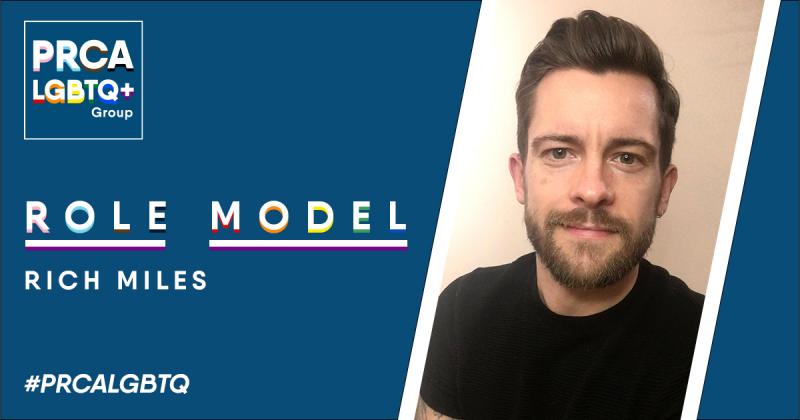
We’re proud to introduce our next LGBTQ+ Role Model, Rich Miles. Rich (he/him) is an established Creative Director, CEO and proud member of the LGBTQ+ community. Passionate about diverse representation, he left his full time job at Therapy Agency to start his own purpose-led organisation, The Diversity Standards Collective (DSC). The DSC works with brands and agencies to bring them closer to diverse people, ensuring that their comms are as authentic and representative as they possibly can be.
As a proud gay man, Rich has been a passionate ally and spokesperson for other members of the LGBTQ+ community. He launched The Right Pronoun App, a gender pronoun converter tool which helps educate people on the correct usage of pronouns for trans and non-binary people. He also launched The Bi Normal Project, a DSC initiative with a mission to shine a light on the bisexual community, who are often unrepresented in advertising.
Rich Miles will be joining us on our panel next week for our PRCA LGBTQ+ Group Webinar: Beyond June – the importance of brands supporting LGBTQ+ causes and conversations outside of Pride Month. You can sign up here.
1. What is your greatest achievement in life?
Adopting my daughter and being a proud queer dad has been my greatest achievement. It sounds corny, but I love having a little person in my life. She's the reason I want the industry to change. I don't want her to continue to not see families like hers on TV or in ads, I don't want her to feel different for having two dads.
2. What is your greatest professional achievement?
Like any creative, I always had the goal of becoming a Creative Director and winning a Cannes Lion. It's only as I got older that I realised that wouldn't actually fulfil anything for me. I didn't need my work respected by others, I needed my life, my queerness to be respected by others. That's when I started dabbling in things that would help that, firstly with setting up the right pronoun, to help the industry stop misgendering my community, and now The Diversity Standards Collective. To be specific, my proudest achievement was the first time I managed to get a big brand to pay to listen to the opinions of LGBTQ+ people. Before this point, brands created ads based on bias, stereotyping and assumption, which often portrayed LGBTQ+ people in a negative light. It felt so good to be able to contribute towards genuine, authentic representation for the community that will help to further normalise LGBTQ+ people in mainstream society.
3. In what way, if at all, do you believe being a member of the LGBT community has affected the professional opportunities you’ve had?
Dramatically, I wouldn't be where I am today if I wasn't lucky enough to be gay. I was told 10 years ago by a global client that we couldn’t work with the LGBTQ+ couple that I wanted to cast for a social competition, as they had no place in the brand’s campaign and would reflect badly on the brand. From that moment on, I decided that no one would ever use being LGBTQ+ to close a door on me. Now, I actively use it to open doors. I have harnessed it to get on panels, I have harnessed it to get into the room and be heard by people far more experienced and senior than me, and I now use it every day, to get brands to speak to me and work with me. I do this so prominently and so loudly in hope that the next generation of LGBTQ+ who come after me won’t have to.
4. What positive change have you seen and/or personally managed to effect for the LGBT community over the course of your career?
Members of the LGBTQ+ community are often used by big brands, and the community often gets nothing in return. For example, brands may speak to a trans person and ask them for insights, using their weight as a big brand to get that for free, and then go to make millions from it, leaving the trans person with nothing. This is especially hard for a community that faces so much rejection from society, and because of this, in many cases, they find it hard to get work. This is why I was so proud the first time I was able to pay an LGBTQ+ person money for their personal insights and opinions. They matter, and their lived experience is valuable.
5. What do you hope the near future holds for progress in inclusivity in the communications industry and how can individuals make a difference?
I hope that diverse inclusivity will soon be at the core of everything, not an afterthought during casting, or something that's given a separate 'diversity budget' that’s always something like 95% less than the budget set aside for straight white audiences. Hopefully, the comms industry will see all audiences as diverse and begin to include all in the entire creative process, not just in casting. This will then hopefully lead to my business no longer needing to exist.
If you’d like to nominate an LGBTQ+ Role Model, or if you’d like to share your own story, please get in touch with us at lgbtq@prca.org.uk.
